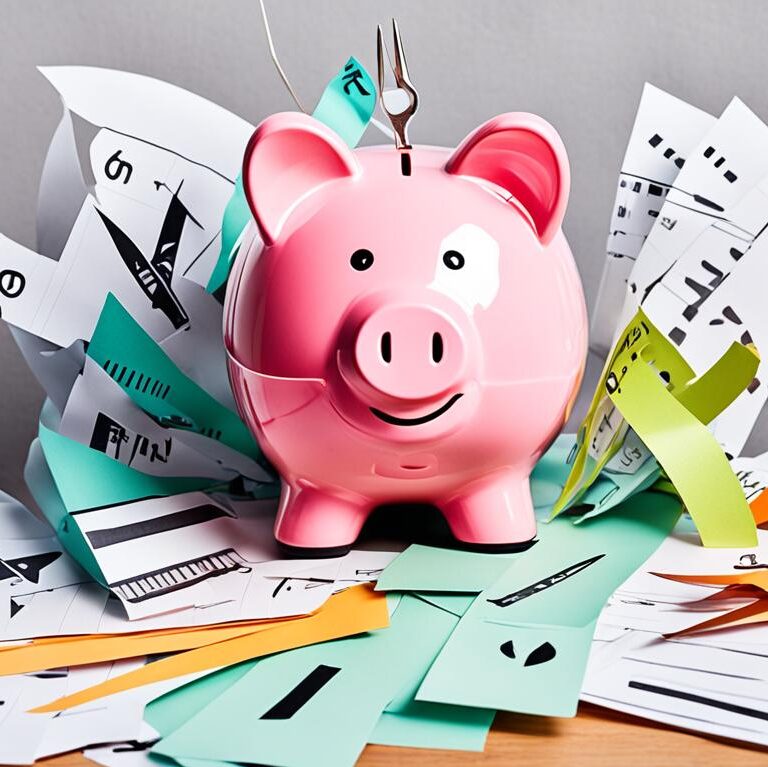“As an Amazon Associate I earn from qualifying purchases.”
Imagine waking up to news that stocks are falling fast. The S&P 500 is having a terrible week. You start to worry about your savings. Losing financial stability is a scary thought. However, there’s light at the end of the tunnel. History tells us the right moves can help us through tough times. This article shows how to protect your investments in a recession. It offers smart ways to keep your finances safe.
Being proactive helps a lot, like not rushing to change your investments during a downturn. Also, consider “buying the dip” if you can afford it. It’s all about reading the market and making smart choices. For more tips on protecting your investments, check out this guide. Remember, having a variety of investments is key. Investing in essentials and using a robo-advisor can help. A top-rated service by NerdWallet recommends this approach.
Key Takeaways
- Proactive measures can safeguard investments during a recession.
- Diversifying your portfolio helps in mitigating risks.
- Consulting a highly rated robo-advisor can streamline investment management.
- Avoid rebalancing your portfolio during market lows.
- Creating an emergency fund with three to six months of living expenses is crucial.
Understanding Recession and Its Impact on Your Portfolio
When the economy goes down, keeping your investments safe is key. The ups and downs in financial markets during a recession make investors look at their choices carefully. Knowing about these issues can help protect and even grow your portfolio.
What is a Recession?
A recession means the economy is shrinking for months, marked by less spending and more unemployment. It’s when things like GDP go down. Negative beta values show which securities might do well in a recession by moving opposite to the market. U.S. Treasury bonds, backed by the government, are usually safe bets during such times.
How a Recession Impacts Financial Markets
Recessions change how investments perform, making some stocks, like utilities, more appealing because they’re stable. For example, during tough times, Walmart did well because their business model is strong. People also buy less from expensive brands, choosing cheaper options instead. This affects the whole market.
Common Triggers of a Recession
Many things can start a recession. It could be geopolitical issues, inflation, bursting bubbles, or problems like an inverted yield curve. For example, fears of recession grew in early August 2024 after a global market scare and a poor U.S. jobs report. Gold often becomes more valuable in recessions, as seen in 1973, 1974, 2002, and 2008.
Knowing what causes and results from recessions helps investors manage in uncertain times. To keep investments safe, you need to be alert, diversify wisely, and stay informed.
Diversifying Your Investments for Stability
In uncertain economic times, it’s key to diversify assets and plan your allocations carefully for financial stability. Aiming for a diverse portfolio helps soften the blow of market swings. This is because spreading your investments across different asset types can lessen the impact of volatility.
Importance of Asset Allocation
Asset allocation is like planning in a strategic game. The goal is to lower risk and increase returns. Diversifying into asset classes such as stocks, bonds, and real estate helps balance your portfolio. For example, the S&P 500 index has over 500 parts. This makes it more varied than the Dow Jones Industrial Average with just 30 stocks. Investing across different asset classes shields your portfolio from drops in specific sectors.
Spreading Investments Across Different Sectors
Diversifying across asset classes, industries, and regions is crucial for stability. Sectors behave differently based on economic changes. For instance, utility stocks stay stable in recessions, unlike others that may fall sharply. Additionally, industries like healthcare and consumer staples usually offer more consistent returns.
Investing diversely might mean choosing:
- High Dividend Stocks: Pick companies with regular, high dividend payments for income in tough times.
- Exchange-Traded Funds (ETFs): These give access to various sectors, like stable, non-cyclical industries.
- Dollar-Cost Averaging: By spreading purchases, this approach lessens the risk from market changes.
Experts suggest having 20 to 30 different investments for a well-rounded portfolio. With these strategies, investors can better handle downturns and build a stronger portfolio.
Investing in Defensive Sector Funds
Defensive sector funds focus on basic services people always need, like utilities, healthcare, and food. They include mutual funds and ETFs targeting industries that do well even when the economy doesn’t. These sectors keep consumer demand high, no matter how tough times get. This makes them great options for investments that can withstand economic downturns.
By investing in these funds, you’re using a smart defensive investment strategy. You’re putting your money into areas like healthcare with companies such as Johnson & Johnson and Pfizer. Or in consumer staples with names like Kroger and PepsiCo. There are also utilities like American Water Works. These investments are known for their stability and the steady money they return, regardless of market conditions.
It’s not wise to shift all your investments to these funds. But adding them can protect your money during bad economic times. They come with low risks of losing value. Thus, they mix safety and consistent performance well.
“Defensive sector funds confer a sense of security in a well-diversified portfolio by balancing high-risk investments and ensuring steady returns.”
Here’s a closer look at defensive sector investments known for being strong during recessions:
| Sector | Key Companies | Characteristics |
|---|---|---|
| Healthcare | Johnson & Johnson, CVS Health, Pfizer, UnitedHealth Group, Medtronic | Stable demand for essential healthcare products and services |
| Utilities | American Water Works, NextEra Energy, Waste Management | Consistent revenue streams from necessary services |
| Consumer Staples | Kroger, PepsiCo, Procter & Gamble, General Mills | Essential goods with steady demand |
Adding defensive sector funds to your investments can be smart. They help keep your money safe during recessions. This offers some financial stability in uncertain times.
Building a Recession-Resilient Portfolio Through Diversification
Creating a recession-resilient portfolio means being strategic about diversification. This approach includes investments that do well during tough economic times. It’s key to invest in high-dividend stocks and funds focused on essential consumer industries.

Deloitte’s survey found that 79% of CEOs expect a recession soon. The IMF says one-third of the world’s economy might shrink in 2023. This is mainly because of stricter monetary policies. That’s why it’s crucial to focus on recession-resilient portfolio management.
Investors often use Smallcase to allocate their investments smartly. Smallcase provides “smallcases,” or portfolios, focusing on certain themes or strategies. These portfolios, made by experts, aim for long-term growth. This offers a smart alternative to picking individual stocks or complicated ETFs.
Smallcase ensures long-term strength by considering market cycles and recession impacts. They suggest putting more into sectors like consumer staples, healthcare, and utilities. These sectors tend to withstand economic slowdowns well.
It’s wise to invest in companies known for regular dividend payments. Dividends offer steady income, which is vital during tough times. Focusing on undervalued stocks with solid basics is also wise. This strategy can lead to growth in a well-rounded, recession-ready portfolio.
| Investment Strategy | Benefits |
|---|---|
| High-Dividend-Yielding Stocks | Provides steady income during market volatility |
| Consumer Staple ETFs | Stability through economic downturns |
| Smallcase Portfolios | Expertly curated for long-term growth |
| Defensive Sector Weighting | Focus on resilient sectors like healthcare, utilities |
| Value Investing | Long-term growth with strong fundamentals |
Spreading investments across different industries, places, and company sizes helps lower risk. History tells us that staying invested through recessions often leads to full recovery. So, having a diverse portfolio is a defense against market ups and downs, offering stability when the economy struggles.
Safe Investments During Economic Downturns
During economic downturns, it’s key to pick defensive investments. This approach helps keep your finances stable. We’ll look at safe choices for investing during tough times. Such options include utilities, consumer staples, healthcare, pharmaceuticals, and precious metals.
Utilities and Consumer Staples
Utilities and consumer staples stand out during economic slumps. They’re essential, involving grocery stores and utility companies like Duke Energy and PG&E. These sectors keep going, no matter the economy’s state, making them strong choices for investors. To learn more, check out our guide on recession impacts.
Healthcare and Pharmaceuticals
Healthcare and pharmaceuticals are great defenses in downturns. Firms such as Pfizer and Johnson & Johnson often stay stable. They keep growing because people always need health services and medicines, regardless of economic issues.
Precious Metals and Commodities
Gold and other precious metals can protect against stock market drops. They do well when the economy is shaky. Investing in them keeps your strategy strong as they usually keep their value, even when stocks don’t.
To sum it up, focusing on recession-proof investment strategies is wise. Including utilities, consumer staples, healthcare, pharmaceuticals, and precious metals in your portfolio makes it more durable against economic downturns.
Analyzing the Current Economic Climate
Understanding economic indicators is essential in these uncertain times. We must look at signs like interest rates, inflation, and growth in different industries. These insights can guide us in making smart investment choices.
Market Signals to Watch For
Several signs can tell us about the economy’s health. Watching these can inform your decisions:
- Interest Rates: Rising interest rates often mean the economy is tightening. It’s important to follow what the Federal Reserve says.
- Inflation Metrics: High inflation can lower your buying power and hurt the economy. Projections say inflation will continue into 2024.
- Industry Growth Rates: Looking at growth in sectors like tech and healthcare can show economic trends.
- Labor Market Data: With 9.8 million jobs open as of May 2023, the job market is a key economic indicator.
- Stock Market Trends: The stock market tends to go up 75% of the time, so watch for corrections and bear markets for insight.
Assessing Your Financial Situation
It’s also critical to review your finances. This includes:
- Employment Stability: Think about how secure your job is and how an economic downturn could affect it.
- Income Levels: Look at your income sources and their stability.
- Emergency Funds: Make sure you have enough savings for six months of expenses in case your income is interrupted.
- Debt Management: Keep your debt low and manage it wisely to avoid high interest costs.
Stay informed to maneuver through economic downturns wisely. Adjust your investment strategy to avoid hasty choices that lead to bigger losses. Staying invested allows you to benefit from compound growth, which is key to investing success over time.
Leveraging Real Estate for Stability
Investing in real estate during a recession can lead to stability through owning property. Historical data shows that homes for rent, like multifamily homes, stay strong in bad economies. This means there’s always a demand for places to rent. Multifamily properties let investors spread out their risk in just one investment and make steady money. Also, even when times are tough, fewer rental places stay empty, and the cost of renting can still go up.
Right now, some types of property are more stable than others. Self-storage units become more popular as people choose to live simpler lives, which makes them a safe choice. The need for medical office spaces keeps healthcare real estate stable too. Also, investing in things like roads and utilities is a good bet, thanks to government support and their constant need.
Properties with grocery stores are less affected by downturns because they sell necessities, keeping shoppers coming. Investments in green energy, like solar farms, are also promising due to government aid and public interest. Plus, properties rented to one tenant with long-term leases offer steady money flow.
Multifamily housing stands out for its resilience in hard times. It’s smart to use less borrowing, between 55-70%, and go for fixed-rate loans. These properties bring in money from several tenants, which lessens the blow if some can’t pay rent during a recession.
To shield against sudden money troubles, it’s wise to have extra funds ready for high vacancy rates or surprise maintenance. Keeping renters happy and cutting costs can really boost profits. It’s good to mix up investments by area, property type, and strategy to lessen the risk if one market goes down.
The following properties are usually the safest bet:
- Multifamily Housing Developments
- Self-Storage Facilities
- Healthcare Real Estate
- Grocery-Anchored Retail Centers
- Renewable Energy Infrastructure
- Single-Tenant Net Lease Properties
- Manufactured Housing Communities
- Infrastructure Investments
By focusing on these strong areas of real estate, investors can find stability in owning property. They can also aim for long-term growth by choosing sectors that do well even when the economy doesn’t.
Creating an Emergency Fund
An emergency fund is a key part of personal finance. It serves as a financial safety net during hard times. A May Bankrate survey found that only 44% of Americans have saved three months of expenses. With a 70% chance of a recession this year, an emergency fund is more important than ever.

Experts suggest saving for three to six months of expenses. For retirees, they recommend saving five years of expenses in cash. This helps avoid taking money out of investments which could lead to penalties or taxes. These steps strengthen your finance safeguards.
Here are steps for creating an emergency fund:
- Start small: Small savings add up quickly.
- Automate savings: Set up regular transfers to a savings account.
- Cut unnecessary expenses: Put those savings into your emergency fund.
- Build multiple income streams: Having a side hustle can improve financial security and flexibility.
Choosing the right bank is very important. Look for ones that put customers first and offer good terms and rates. This helps keep your money safe during tough times.
The U.S. has had 34 recessions since 1857, averaging one every 6.5 years since World War II. The last major recession lasted 18 months and the pandemic recession lasted just two months. This shows economic downturns are a regular pattern. It highlights the importance of having an emergency fund ready.
| Key Steps | Benefits |
|---|---|
| Automate Savings | Ensures consistent growth without active management |
| Cut Unnecessary Expenses | Increases contribution to the emergency fund |
| Build Multiple Income Streams | Provides financial flexibility and reduces dependence on a single source |
| Opt for Customer-Oriented Financial Institutions | Offers better terms, enhancing overall financial stability |
By saving wisely and following these tips, you can prepare for and do well in future recessions.
Recession Proofing Your Portfolio with Smart Strategies
To safeguard your investments during downturns, start by understanding your risk tolerance. This means knowing how much market volatility you can handle. It helps you make smarter financial choices. This way, your investments stay safe, even in tough times.
Understanding Your Risk Tolerance
Knowing your risk tolerance is vital, especially with a recession possibly on the horizon. Think about your financial goals and how you feel about market swings. Experts think there’s a 70% chance of a recession in the U.S. this year. So, it’s crucial to prepare your investments for any market drops.
Adjusting Investment Strategies Accordingly
After figuring out your risk level, adjust your investments to match. This may mean changing your portfolio based on the economy’s state. In recessions, it’s wise to move towards stable investments. Good options are large-cap stocks, precious metals like gold and silver, commodities, and real estate. Having cash on hand is also important. It acts as a safety net and lets you buy low-priced investments during downturns.
Experts suggest keeping a diversified portfolio. Spread your investments across different sectors and asset types to lower risk. By using these smart moves, you can protect your investments. Even better, you can grow your wealth during and after economic downturns. This leads to financial strength.
FAQ
What is a Recession?
How does a Recession Impact Financial Markets?
What are Common Triggers of a Recession?
What is the Importance of Asset Allocation?
Why Should Investments be Spread Across Different Sectors?
What are Defensive Sector Funds?
What Investments Help Build a Recession-Resilient Portfolio?
Which Investments are Considered Safe During Economic Downturns?
What Market Signals Indicate a Looming Recession?
How Should One Assess Their Financial Situation During an Economic Downturn?
How Does Real Estate Provide Stability in a Recession?
Why is an Emergency Fund Important?
How Can One Recession-Proof Their Portfolio?
“As an Amazon Associate I earn from qualifying purchases.”

